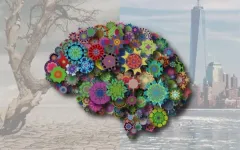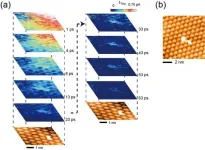INFORMATION:
The team, based in the Lambe Institute at NUI Galway, are the only Irish investigators contributing to this study. Biological samples and data from the BIGGS group are part of the Horizon 2020 funded BRIDGES study.
The NUI Galway BIGGS study has included 1,000 cancer patient samples and 1,000 population-based controls recruited specifically from hospitals in the West of Ireland since 2001 and from community/retirement groups in this region from 2001-2008.
A copy of the study, 'Breast cancer risk genes: association analysis in more than 113,000 women' in the New England Journal of Medicine is available at https://www.nejm.org/doi/full/10.1056/nejmoa1913948.
This BIGGS research was supported by the National Breast Cancer Research Institute. For more information visit http://www.breastcancerresearch.ie/.
See video with Professor Michael Kerin talking about the study at https://youtu.be/4s0q4asRTfs. END
NUI Galway contribute to significant breast cancer risk genes study
NUI Galway breast cancer specialists contribute to international study on the identification of nine breast cancer risk genes
2021-01-21
(Press-News.org) Breast cancer investigators in the Lambe Institute at NUI Galway have collaborated on a pivotal international study into breast cancer risk which was published in the New England Journal of Medicine today (Wednesday, 20 January). The results of the study have identified that there are nine specific genes associated with breast cancer risk.
Contributing authors Professor Michael Kerin, Chair of Surgery at NUI Galway, Director of the Cancer Managed Clinical Academic Network for Saolta University Health Care Group, along with Dr Nicola Miller, Lecturer in NUI Galway's School of Medicine, have directed the Breast Cancer in Galway Genetics Study (BIGGS) since 2008. DNA samples, which have been collected from 2,000 Irish patients and controls have contributed to the findings of this paper, and to numerous high impact publications in the past decade.
Led from the University of Cambridge, the BRIDGES (Breast Cancer Risk after Diagnostic Gene Sequencing) study aimed to identify women at high risk of breast cancer and to develop sensitive and informative gene panel testing for the prediction of breast cancer risk. Gene panel testing is a technique in which a number of specific genes that are linked to a particular genetic condition are examined at the same time.
Gene panel testing for breast cancer susceptibility is widely used, but there is only weak evidence for cancer risk association with many genes. The BRIDGES study tested 34 potential "risk" genes from 60,466 breast cancer cases worldwide and 53,461 controls (patients who did not have breast cancer) from 44 international studies in the Breast Cancer Association Consortium. The study found that variants in nine genes were associated with breast cancer risk (ATM, BRCA1, BRCA2, CHEK2, PALB2, BARD1, RAD51C, RAD51D, TP53).
Professor Michael Kerin, who is also Research Director of the National Breast Cancer Research Institute, a voluntary national charity that funds a comprehensive research programme at the Lambe Institute in NUI Galway, said: "With this study we can identify the members within families who have abnormal genes that puts them at a higher risk of getting breast cancer, and they can avail of strategies such as early screening and risk reduction surgery, in order to improve their life expectancy."
Professor Kerin said that the success of this research is testament to the power of bio-banking and the need to futureproof research: "Having a set of bio-banked samples and the ability to closely follow up with these patients has enabled us to add value to international research studies and improve the knowledge base around breast cancer risk.
"The BRIDGES study has revealed that changes which were thought to be unimportant in the well-known breast cancer genes, BRCA1 and BRCA2 are significant, and this allows us to manage the risk of developing breast cancer in people affected by these gene alterations."
Acknowledging the support of breast cancer research charity funding, Dr Nicola Miller said: "This work highlights the importance of collaboration in breast cancer research in the generation of data of global significance. It helps to better define the genes associated with breast cancer risk. While we can't change the genes we inherit, this knowledge will benefit patients undergoing genetic testing for breast-cancer susceptibility. We gratefully acknowledge the ongoing support of the National Breast Cancer Research Institute for funding the Irish contribution of this study."
ELSE PRESS RELEASES FROM THIS DATE:
CNIO participates in a study that defines the most important genes that increase breast cancer risk
2021-01-21
Genetic inheritance affects the likelihood of developing breast cancer. Some genes are already known to increase cancer risk; other genes are suspected to be involved, but not to what extent. It is crucial to clarify this issue to improve prevention since it opens the way to more personalised follow-up and screening programs. A large international consortium, which includes the Spanish National Cancer Research Centre (CNIO), has studied 34 putative susceptibility genes on samples from 113,000 female breast cancer cases and controls, and its results confirm the importance ...
Ten suggestions for female faculty and staff during the pandemic
2021-01-21
When university campuses sent students, staff and faculty members home in March, Padmini Rangamani, a professor at the University of California San Diego, suddenly found herself running her research lab remotely, teaching her classes online, and supervising her two children, ages 10 and 13, who are also learning online.
To deal with the stress the situation created, Rangamani turned to a support network of fellow female faculty members around the United States. They chatted and texted and eventually decided to write a scholarly article with recommendations for all other female principal investigators in academia.
The article, "Ten simple rules for women principal investigators during a pandemic," ...
Taking sieving lessons from nature
2021-01-21
Generating membranes using electrochemical polymerization, or electropolymerization, could provide a simple and cost-effective route to help various industries meet increasingly strict environmental regulations and reduce energy consumption.
Researchers from KAUST have produced membranes with well-defined microscopic pores by electrochemically depositing organic conjugated polymers onto highly porous electrodes. These microporous membranes have numerous applications, ranging from organic solvent nanofiltration to selective molecular transport technologies.
High-performance separation depends on membranes that are robust with well-ordered and dense microporous structures, such as zeolites and ...
Alpha particles lurk at the surface of neutron-rich nuclei
2021-01-21
Scientists from an international collaboration have found evidence of alpha particles at the surface of neutron-rich heavy nuclei, providing new insights into the structure of neutron stars, as well as the process of alpha decay.
Neutron stars are amongst the most mysterious objects in our universe. They contain extremely dense matter that is radically different from the ordinary matter surrounding us--being composed almost entirely of neutrons rather than atoms. However, in the nucleus at the center of normal atoms, matter exists at similar densities.
"Understanding the nature of matter at such extremes is important for our understanding of neutron stars, as well as the beginning, ...
COVID-19 is dangerous for middle-aged adults, not just the elderly
2021-01-21
COVID-19 has been spreading rapidly over the past several months, and the U.S. death toll has now reached 400,000. As evident from the age distribution of those fatalities, COVID-19 is dangerous not only for the elderly but for middle-aged adults, according to a Dartmouth-led study published in the European Journal of Epidemiology.
"For a person who is middle-aged, the risk of dying from COVID-19 is about 100 times greater than dying from an automobile accident," explains lead author Andrew Levin, a professor of economics at Dartmouth College. "Generally speaking, very few children and young adults die of COVID-19. However, the risk is progressively greater for middle-aged and older adults. The odds that ...
Researchers make domestic high-performance bipolar membranes possible
2021-01-21
The bipolar membrane, a type of ion exchange membrane, is considered the pivotal material for zero emission technology. It is composed of an anode and cathode membrane layer, and an intermediate hydrolysis layer. Under reverse bias, the water molecules in the intermediate layer produce OH- and H+ by polarization.
Large-scale production of the membrane is hindered by the different expansion coefficients of the anode and cathode layers, causing the two layers easy to delaminate. Besides, the mostly used intermediate catalysts are small molecules or transition, which are instable and inefficient.
In a study published on Nature Communications, a team led by ...
Does aspirin lower colorectal cancer risk in older adults? It depends on when they start.
2021-01-21
BOSTON - Regular aspirin use has clear benefits in reducing colorectal cancer incidence among middle-aged adults, but also comes with some risk, such as gastrointestinal bleeding. And when should adults start taking regular aspirin and for how long?
There is substantial evidence that a daily aspirin can reduce risk of colorectal cancer in adults up to age 70. But until now there was little evidence about whether older adults should start taking aspirin.
A team of scientists set out to study this question. They were led by Andrew T. Chan MD, MPH, a gastroenterologist and chief of the Clinical and Translational Epidemiology Unit at Massachusetts General Hospital (MGH). Their report appears in JAMA Oncology.
The researchers ...
How the brain learns that earmuffs are not valuable at the beach
2021-01-21
Tsukuba, Japan -- How valuable are earmuffs? The answer to this simple question can depend. What brand are they? Are they good quality? What is the weather like? Given the choice between earmuffs and suntan lotion, most people would choose to have the earmuffs on a cold winter day and the lotion on a sunny day at the beach. This ability to place different values on objects depending on the environmental context is something that we do all the time without much thought or effort. But how does it work? A new study led by Assistant Professor Jun Kunimatsu at the University of Tsukuba in Japan and Distinguished Investigator Okihide Hikosaka at the National Eye Institute (NEI) in the United States has discovered the part of ...
Search for axions from nearby star Betelgeuse comes up empty
2021-01-21
The elusive axion particle is many times lighter than an electron, with properties that barely make an impression on ordinary matter. As such, the ghost-like particle is a leading contender as a component of dark matter -- a hypothetical, invisible type of matter that is thought to make up 85 percent of the mass in the universe.
Axions have so far evaded detection. Physicists predict that if they do exist, they must be produced within extreme environments, such as the cores of stars at the precipice of a supernova. When these stars spew axions out into the universe, the ...
Electrons caught in the act
2021-01-21
Tsukuba, Japan - A team of researchers from the Faculty of Pure and Applied Sciences at the University of Tsukuba filmed the ultrafast motion of electrons with sub-nanoscale spatial resolution. This work provides a powerful tool for studying the operation of semiconductor devices, which can lead to more efficient electronic devices.
The ability to construct ever smaller and faster smartphones and computer chips depends on the ability of semiconductor manufacturers to understand how the electrons that carry information are affected by defects. However, these motions occur on the scale of trillionths of a second, and they can only be seen with a microscope that can image individual atoms. ...
LAST 30 PRESS RELEASES:
New study reveals how a key receptor tells apart two nearly identical drug molecules
Parkinson’s disease triggers a hidden shift in how the body produces energy
Eleven genetic variants affect gut microbiome
Study creates most precise map yet of agricultural emissions, charts path to reduce hotspots
When heat flows like water
Study confirms Arctic peatlands are expanding
KRICT develops microfluidic chip for one-step detection of PFAs and other pollutants
How much can an autonomous robotic arm feel like part of the body
Cell and gene therapy across 35 years
Rapid microwave method creates high performance carbon material for carbon dioxide capture
New fluorescent strategy could unlock the hidden life cycle of microplastics inside living organisms
HKUST develops novel calcium-ion battery technology enhancing energy storage efficiency and sustainability
High-risk pregnancy specialists present research on AI models that could predict pregnancy complications
Academic pressure linked to increased risk of depression risk in teens
Beyond the Fitbit: Why your next health tracker might be a button on your shirt
UCSB scientists bottle the sun with liquid battery
Lung cancer drug offers a surprising new treatment against ovarian cancer
When consent meets reality: How young men navigate intimacy
Siemens Healthineers and Mayo Clinic expand strategic collaboration to enhance patient care through advanced technology
Physicists develop new protocol for building photonic graph states
OHSU-led research initiative examines supervised psilocybin
New review identifies pathways for managing PFAS waste in semiconductor manufacturing
New research finds state-level abortion restrictions associated with increased maternal deaths
New study assesses potential dust control options for Great Salt Lake
Science policy education should start on campus
Look again! Those wrinkly rocks may actually be a fossilized microbial community
Exposure to intense wildfire smoke during pregnancy may be linked to increased likelihood of autism
Children with Crohn’s have distinct gut bacteria from kids with other digestive disorders
Genomics offers a faster path to restoring the American chestnut
Caught in the act: Astronomers watch a vanishing star turn into a black hole
[Press-News.org] NUI Galway contribute to significant breast cancer risk genes studyNUI Galway breast cancer specialists contribute to international study on the identification of nine breast cancer risk genes




